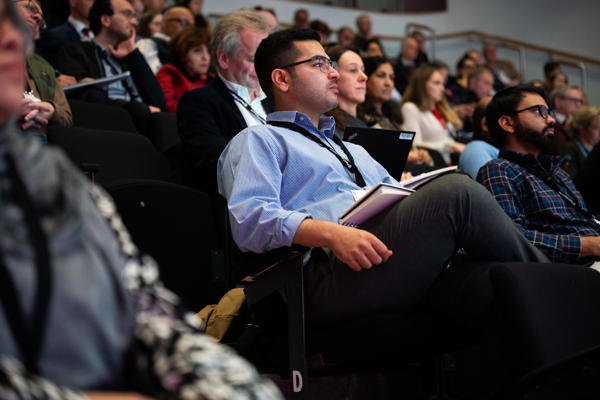Today is Clean Air Day, an annual event that emphasises the importance of clean air for our health, well-being and the planet.
Professor Sir Stephen Holgate, the RCP’s special advisor for air quality, yesterday gave evidence to the Environmental Audit Committee inquiry on the government's outdoor and indoor air quality targets.
Professor Holgate provided key insights into the accumulative effect air pollution on human health, how the way we perceive air pollution has changed greatly since its more visible appearance in the 1950s, and how a collaborative approach to setting interim air quality targets is key to tackling what has become a significant contributor to ill health.
Professor Holgate said: “The knowledge base now around adverse health conditions and air pollution is very high indeed.
“The important aspect here is that the nature of air pollution is changing compared to what it was in the 50s and 60s. This is to do with the sources of emission. In essence, these air pollutants, particularly the very small particles, can pass through the lung into the circulation. Air pollution can cross over the placenta into the foetal circulation. There have been several recent studies demonstrating particles embedding in the heart, brain and liver of the foetus and we now know that these pollutants can alter the way organs develop.”
Long-term exposure to PM2.5 is associated with cardiovascular morbidity and a reduction in life expectancy. Analysis by the Clean Air Fund and Imperial College London in 2022 found that reducing pollution from toxic fine particulate matter ‘PM2.5’ to 10µg m-3 would lead to 3,100 fewer new cases of coronary heart disease and 388,000 fewer reported asthma symptom days in children each year.
When speaking about government targets Professor Holgate said: “Targets aren’t ceilings which you fill up to, they should be interim targets that we’re trying to aim at so that we can, over a period of time, track more precisely what we’re achieving by cleaning up the air, rather than having these absolute numbers.”
In November 2022 the RCP and other health and environmental organisations wrote to the DEFRA secretary of state, calling for a clear commitment to reduce PM2.5 to 10μg m-3 by 2030. In December last year government set a legal target under the Environment Act to reduce PM2.5 to 10μg m-3 by 2040. The RCP is clear that policy makers must go further in their efforts than required by current legal targets to improve air quality. Doing so would yield significant public health benefits.
Professor Holgate said there needed to be more visibility of air pollution levels in urban settings, adding “There has been a fantastic investment by this country in research in air pollution. We will be able to have much more granular knowledge of what the air pollution is in your local area – and that needs to be made more visible for the public and those looking after health. We haven’t got that at the moment – in many countries around the world they do have that.”
The RCP has had a long standing interest in tackling air pollution. Earlier this year, the RCP launched sustainability and climate change campaign which urged the government, among other things, to prioritise a just transition from fossil fuels. Our report on healthcare sustainability and climate change emphasised the need to fully implement the recommendations of the chief medical officer's 2022 report on air pollution and take robust action across various sectors to enhance both outdoor and indoor air quality.
In 2021 the RCP was one of the organisations required to respond to that the coroner’s prevention of future deaths report issued following the inquest into the death of Ella Adoo-Kissi-Debrah. The narrative conclusion of the inquest into Ella’s death was that she died of asthma, contributed to by exposure to excessive air pollution. This is the first time air pollution was listed as a cause of death in the UK. In our response, we said that we would work with specialist societies, the Academy of Medical Royal Colleges and other royal college partners, the UK Health Alliance on Climate Change and others to communicate the health impacts of air pollution.
In June 2022 the RCP published a progress report on action taken since, including amplifying clean air day resources to members and continuing to review how air pollution is covered in the Internal Medicine Curriculum. We continue to produce resources and materials on air quality for members – including through podcasts, dedicated sessions on air pollution at our major annual conference and in member magazines and journals.
We at the RCP recognise that an organisation flourishes when its employees are healthy. At the heart of The Spine, the RCP's own northern home, lies the focus on air quality. The building has been meticulously designed to ensure exceptional indoor air quality, prioritising the well-being of all its occupants.
With biophilic design principles, the Spine places nature and the environment at its core. The building meets global best practice standards for ventilation systems, with regular monitoring to maintain optimal air quality levels. Moreover, a diverse range of plants throughout The Spine contribute to improved indoor air quality. You can explore the health benefits of these plant species by referring to this plant list.
For additional resources and information on Clean Air Day, we encourage you to visit the Action for Clean Air website.



